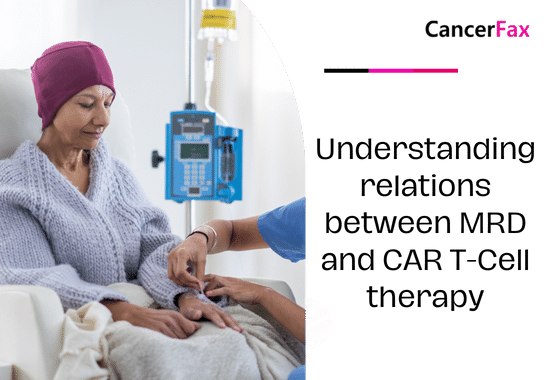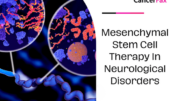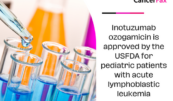Understanding relations between MRD and CAR T-Cell therapy
What is MRD in cancer treatment?
Measurable Residual Disease, or MRD, is the name for the very few cancer cells that stay in the body after or during treatment. Flow cytometry, polymerase chain reaction (PCR), or next-generation sequencing are very sensitive techniques that can find these cancer cells even when standard diagnostic methods, like imaging scans, can’t.
Monitoring MRD is very important for deciding how to treat different types of blood cancer, such as acute lymphoblastic leukemia (ALL), acute myeloid leukemia (AML), chronic myeloid leukemia (CML), lymphomas, and multiple myeloma. It helps figure out how likely it is that someone will return and can be used to change treatment plans as needed.
When someone has cancer, MRD testing is used to see how well the treatment is working and to help plan more treatments. For instance, if MRD is found after the first treatment, it could mean that the cancer is not responding well to the present treatment and changes need to be made. If, on the other hand, MRD stops being found after treatment, it means that the cancer is no longer growing and that the treatment is working.
To sum up, MRD is an important idea in cancer treatment because it helps figure out how well the treatment is working and helps plan future treatments. It is necessary to keep track of the growth of people with different types of blood cancer and can be used to guess how likely it is that the cancer will come back.
You may like to read: CAR T-Cell therapy in China
How is MRD detected in cancer patients?
Flow cytometry, polymerase chain reaction (PCR), or next-generation sequencing are very specific methods used to find Measurable Residual Disease (MRD) in cancer patients. Traditional ways of diagnosing cancer might miss a very small number of cancer cells that these methods can find. Testing for MRD is very important for keeping track of how well cancer treatment is working and planning new treatments.
In solid tumors, MRD identification is necessary to find patients who still have lesions after surgery. About 10 to 15 percent of these patients need to be looked at more closely. It is very important to keep an eye on MRD in people with blood cancers like ALL, AML, CML, lymphomas, and multiple myeloma so that doctors can make choices about treatment and guess how the patient will do.
In general, finding MRD in cancer patients means using modern and sensitive methods to find cancer cells that may not be found with older methods. This tracking is very important for figuring out how well the treatment is working and what other therapeutic steps should be taken.
What are the common methods used to detect MRD in cancer patients?
Some common ways to find Measurable Residual Disease (MRD) in cancer patients are:
1. Flow Cytometry: This method looks at the features of cells in a sample to find abnormal cells that could mean MRD is present.
2. Polymerase Chain Reaction (PCR): PCR is a molecular method used to find and copy specific DNA patterns, which lets scientists find small amounts of cancer cells in a sample.
3. Next-Generation Sequencing (NGS): NGS is a high-throughput sequencing tool that can find genetic changes linked to cancer. This helps find MRD with high sensitivity and specificity.
These methods are very important for keeping an eye on cancer patients during and after treatment. They help to figure out how well the treatment worked, guess what would happen, and plan for more treatments.
You may like to read: CAR T-Cell therapy cost in China
What is the significance of MRD in CAR T Cell therapy?
Measurable Residual Disease (MRD) is a very important part of CAR T cell therapy because it helps doctors figure out how well the treatment will work and what results to expect. Studies have shown that getting rid of MRD after CAR T-cell therapy can increase the chance of life, especially in people whose MRD response wasn’t as good as it could have been. Researchers are also looking into MRD tests as a way to predict early relapse and see how well treatment is working after CAR T-cell therapy.
For acute lymphoblastic leukemia (ALL), MRD has become an important marker for predicting the outcome of research and figuring out who is at risk, especially when it comes to CAR T-cell treatment. Positive MRD testing before transplant has been linked to better clinical results in CAR-T therapy followed by haploidentical hematopoietic stem cell transplantation for relapsed or refractory acute lymphoblastic leukemia. This shows how important MRD testing is for treatment success.
Overall, MRD assessment is an important part of CAR T cell therapy because it helps doctors track treatment reactions, predict relapse, and customize treatment plans to get the best results for each patient.
You may like to read: CAR T-Cell therapy for multiple myeloma in China
Is MRD being negative essential before CAR T Cell therapy?
Getting rid of MRD is important before CAR T cell therapy because it has been shown to improve patient results and survival rates. Studies show that CAR-T therapy can successfully get rid of MRD and increase survival in people whose MRD response isn’t as good as it could be. Also, having a negative MRD test before a transplant has been linked to better clinical results in CAR-T therapy for acute lymphoblastic leukemia that has relapsed or stopped responding to treatment. Also, if MRD stays or comes back after treatment, it can help doctors guess when B-cell acute lymphoblastic leukemia patients will have another relapse. In the case of myeloma, early measurement of the MRD status of the bone marrow is a good indicator of survival in CAR-T therapy. So, getting negative for MRD before CAR T cell therapy is a big part of making the treatment work better and improving patient results.
Susan Hau is a distinguished researcher in the field of cancer cell therapy, with a particular focus on T cell-based approaches and cancer vaccines. Her work spans several innovative treatment modalities, including CAR T-cell therapy, TIL (Tumor-Infiltrating Lymphocyte) therapy, and NK (Natural Killer) cell therapy.
Hau's expertise lies in cancer cell biology, where she has made significant contributions to understanding the complex interactions between immune cells and tumors.
Her research aims to enhance the efficacy of immunotherapies by manipulating the tumor microenvironment and exploring novel ways to activate and direct immune responses against cancer cells.
Throughout her career, Hau has collaborated with leading professors and researchers in the field of cancer treatment, both in the United States and China.
These international experiences have broadened her perspective and contributed to her innovative approach to cancer therapy development.
Hau's work is particularly focused on addressing the challenges of treating advanced and metastatic cancers. She has been involved in clinical trials evaluating the safety and efficacy of various immunotherapy approaches, including the promising Gamma Delta T cell therapy.
- Comments Closed
- March 6th, 2024






CAR-T durability predictors, CAR-T response assessment, Liquid biopsy for MRD, Minimal residual disease monitoring, MRD in CAR-T therapy, MRD-guided immunotherapy, MRD-negative remission, Post-CAR-T monitoring
CancerFax is the most trusted online platform dedicated to connecting individuals facing advanced-stage cancer with groundbreaking cell therapies.
Send your medical reports and get a free analysis.
🌟 Join us in the fight against cancer! 🌟
Привет,
CancerFax — это самая надежная онлайн-платформа, призванная предоставить людям, столкнувшимся с раком на поздних стадиях, доступ к революционным клеточным методам лечения.
Отправьте свои медицинские заключения и получите бесплатный анализ.
🌟 Присоединяйтесь к нам в борьбе с раком! 🌟